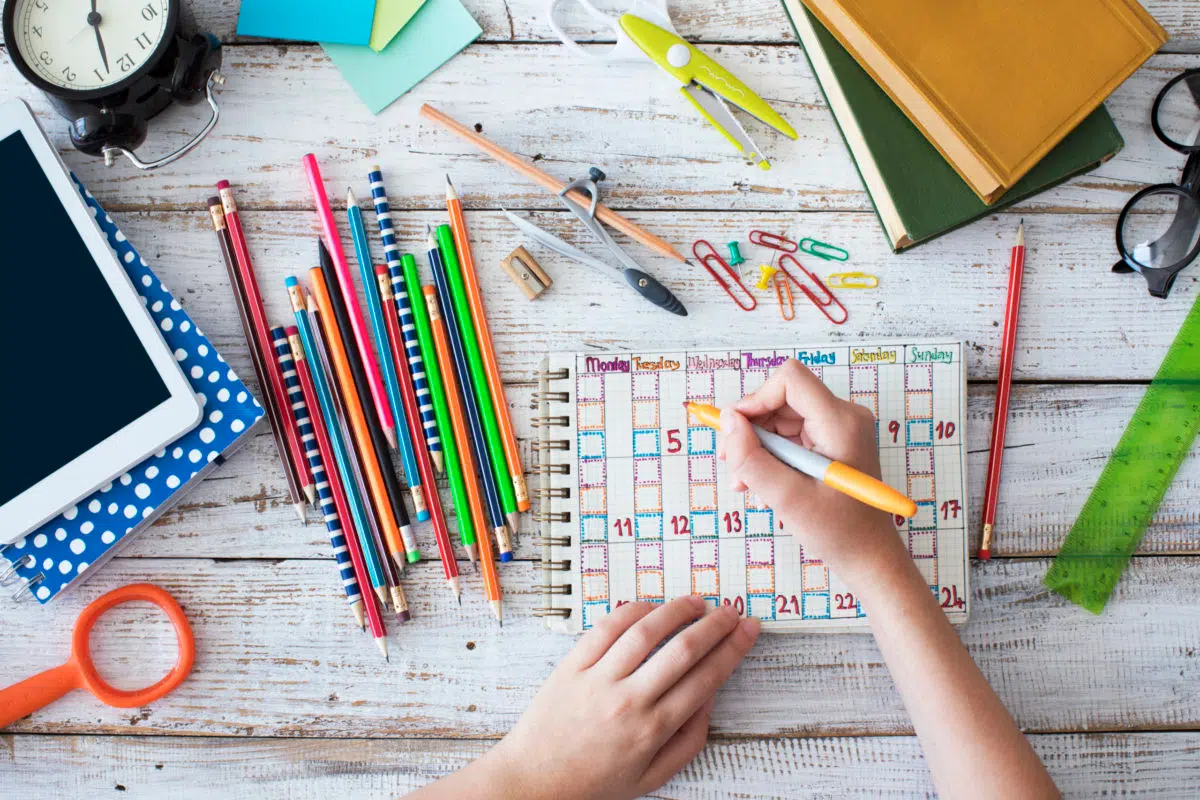Getting kids ready to go back to school is tough. And if you wait until the Sunday night before to start? It’s nearly impossible.
But getting kids into a routine doesn’t have to be so difficult — if you work on building good habits over time, says Dr. Deborah Gatlin, medical director and child psychiatrist at BlueCross BlueShield of Tennessee.
“When it comes to getting kids into (or back into) a routine, it helps if you go step-by-step,” says Dr. Gatlin. “Start by asking kids to pick out their clothes for the next day before they go to bed. A week or two later, once that habit is established, ask them to put their backpacks by the backdoor at bedtime, too, or to help you pack their lunch.
“Pairing responsibility with an increasing ability to make their own decisions is a great way to get kids to take accountability, and to help them build healthy lifelong habits.”
What are the benefits of having a routine?
Dr. Gatlin: Routines are important and healthy for everyone from infants to adults.
Why babies need a routine
Dr. Gatlin: Babies are fully dependent on their parents for everything. A routine lets that infant know that they’re going to be provided for: they’ll be fed when they’re hungry; their diapers will be changed when they’re uncomfortable. This gives them the sense that they can trust their environment.
Once trust is established, routines teach infants that they can have an impact on that environment. If I’m a baby and I learn that every time I cry, someone’s going to come help me, I can control how my environment responds to me. That teaches me that I have an effect on the world — one of the key stepping stones to healthy development.
Why children need a routine
Dr. Gatlin: The ability to trust and have an impact on the world remains important in childhood.
In addition to that, routines help kids and teens:
- Learn that home is a predictable, safe place where they’ll be cared for
- Cope during times of intense change (puberty, divorce, illness or death, etc.)
- Develop a sense of belonging within their family, especially when routines involve having fun or spending time together
- Experience less stress, which is good for their immune systems
- Establish healthy sleep patterns, which is critical during teen years
Dr. Gatlin: Conversely, if I live in a chaotic home, I might learn that when I cry, someone is as likely to ignore me as they are to help me. Obviously, that’s going to cause intense stress and trauma. Uncertainty and chaos are the opposite of a routine.
Why parents need a routine
Dr. Gatlin: For adults, routines establish a simpler, less stressful life. You can develop healthy habits by making them part of your routine — flossing your teeth, reading to wind down before bed, going to the gym or walking around your neighborhood. Physically, you’ll be healthier once those routines are established.
In addition, routines can help you:
- Feel more organized and in control, which reduces stress
- Streamline tasks and free up time for fun family activities
- Feel like you’re doing a good job as a parent
- Cut down on disputes and decisions
Dr. Gatlin: If every Monday night is taco night, that’s one less decision (and potential disagreement) to manage.
How do you create a good routine?
Dr. Gatlin: Good routines all have a few things in common.
Sustainable routines are:
1. Reasonable
Everyone knows what they need to do and believes the system is fair.
Example: Everyone takes turns unloading the dishwasher throughout the week.
2. Predictable
Things happen in the same order every day/week.
Example: Sunday and Wednesday are laundry days for one child; Monday and Thursday for another.
3. Regular
Good routines become so ingrained that, eventually, they feel like they’ve always been a part of your life.
Example: You go to church on Sundays, or you visit grandparents every spring.
Dr. Gatlin: To create a good routine, start with one task at a time. Once that habit becomes second-nature, add another. Once you’ve got a series of events that’s reasonable, predictable, and regular, you have a routine.
6 ways to build healthy habits
However, remember that flexibility is also part of a sustainable routine. It’s okay to deviate from routines on special occasions — it’s part of what makes them special — and to plan free time for everyone to play or relax.
4 way to get kids to adopt a routine
Dr. Gatlin: You probably don’t want to start by calling it “a routine”! That’s going to sound boring and restrictive to kids, which will put them on the defensive.
Instead, try to figure out what could motivate your child to complete each task.
1. Build excitement or anticipation
Dr. Gatlin: Focus on something your child is looking forward to. When you’re getting kids ready to go back to school, stress the fact that all the preparation gets them closer to seeing friends again, playing sports, or buying new school supplies. Positive anticipation is powerful.
2. Stress maturity and responsibility
Dr. Gatlin: Choice and accountability are important.
Framed properly, even chores can signal to a child that:
- They are becoming more of an adult
- They have the power to make decisions, and
- Those decisions matter to you and your family.
Let your child help you in the garden, or give them an allowance for mowing the lawn — something they can’t safely do until they’re a certain age. If they like to cook, let them shop and cook a few nights a week. Put one child in charge of recycling. Letting kids take control of specific household activities will help them build confidence while taking some tasks off your plate.
3. Offer rewards and consequences
Dr. Gatlin: All that said, on a practical level, you may have to resort to bribery or punishment sometimes! That’s okay. No one’s going to be the perfect parent, and you have to pick your battles.
If your child hates brushing their teeth, let them pick out a fun electric toothbrushes or flavored toothpaste. If they still refuse to brush their teeth, incorporate consequences: Either they brush their teeth or they lose screentime. Make the consequences clear and simple; that way you won’t end up feeling unreasonable or guilty.
And feel free to call in an expert! Your child’s dentist or doctor has seen everything. Call them or write down questions so you can pick their brain at your child’s next appointment.
4. Model good behaviors
Dr. Gatlin: If you’re asking your child to avoid screentime before bed, try to practice what you preach. And be honest with them when it’s difficult! It’s important for kids to see you struggle with and overcome challenges, and to be open to talking about those struggles.
Specific advice for 4 common childhood routines
Bedtime
Dr. Gatlin: Don’t harp on going to bed. Instead, stress the positive. Young kids get to pick out a book for a parent to read to them. Older kids can read a book to a parent. Whatever bedtime routine you establish, start getting those back on track a week or two before school starts.
Mornings
Dr. Gatlin: A good morning routine starts the night before. Ask kids to lay out their clothes, pack lunches, put their sports equipment in the car, etc. If they still like to bathe at night, take advantage of that — it’s less that can go wrong in the morning.
If your kids are really not morning people and need a little incentive, tell them they can have a certain amount of screentime for being ready X minutes early. Or let them choose where your next dinner out is for going two weeks without being late.
Homework
Dr. Gatlin: While it’s important to establish a homework routine, this is a task where you can let your child participate in the decision. Ask: When you get home from school, do you want to unwind a little bit before you do your homework or get it done right away? Giving them agency will lead to better, less stressful school work.
For older kids who have larger projects, let them know you’ll help them get set up for success. Get a whiteboard or start a shared family calendar where you can track important dates, whether it’s soccer tryouts or a history project. By helping kids set — and stick to! — a schedule that helps them work toward a goal, you’re helping them build a skill they can use for the rest of their lives.
Chores
Dr. Gatlin: The more kids feel like they’re being trusted to do something rather than being ordered to, the better. Having chores as part of your child’s routine gives them a sense of responsibility, helps them develop life skills, and builds independence.
If you’re open to it, this is another place you can give your child a choice. While everyone has to take out the trash, for example, maybe you let them choose whether their chores include watering the plants, folding laundry, or cleaning the shared bathroom.
If you can, give your kids an allowance — it doesn’t need to be a lot! Not only will the money serve as a reward for the chores, but it will help them start learning financial responsibility. There’s no substitute for making, saving, and managing your own money, and you can’t start too early.






Comments